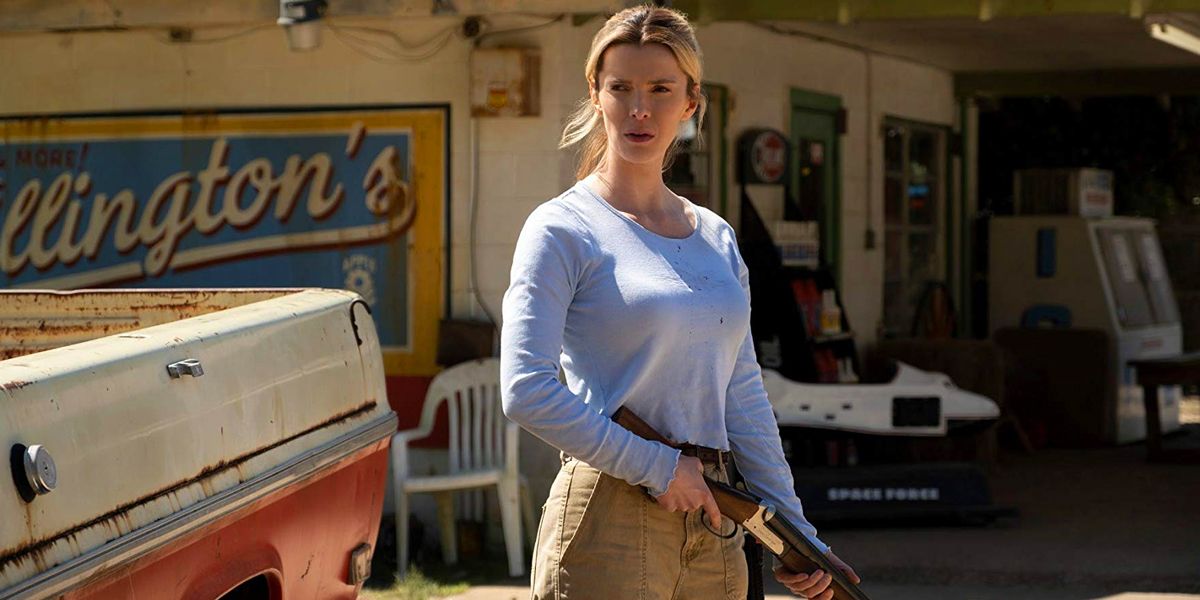Universal Pictures insists it canceled the planned Sept. 27 release of the horror-satire The Hunt in response to the mass shootings in El Paso, Texas; Dayton, Ohio; and Chicago. The studio had pulled television advertising for the Blumhouse Productions film in the wake of the shootings. However, it's impossible not to suspect the decision about The Hunt's fate, made six days later, was influenced by President Donald Trump's tweets condemning Hollywood studios as the "true racists," and describing the film as being made "in order to inflame and cause chaos."
The Hunt seemed to come to Trump's attention because multiple Fox News hosts dedicated time to condemning the film, in which poor rural conservatives are kidnapped and hunted by "liberal elites." On Aug. 9, Trump called for meetings with Hollywood executives to discuss their purported unfair treatment of conservatives. While it's not uncommon for studios and networks to delay or withdraw a film or a TV episode that might be viewed as insensitive in light of real-world tragedies, that Universal's announcement about The Hunt came a day after Trump's tweet seems like no mere coincidence.
Before Fox News started complaining about The Hunt, most of the skepticism about the movie was actually coming from the political left. It's been made clear from both the advertising and a basic understanding of Hunger Games/The Purge-type narratives that the "elites" hunting people are the villains, and that those trying to survive the hunt are the heroes. It seemed like the set-up for the perfect MAGA revenge movie ... and yet, ironically, the crowd this story seemed to be pandering to missed the point and thought it was siding with the villains.
We've actually read a draft of Damon Lindelof and Nick Cuse's screenplay for The Hunt, and it's somewhere between the conservative movie that was being sold and the liberal propaganda Fox News and Trump claimed it was. Like an episode of South Park, it mocks liberals and conservatives. The liberals doing the hunting are the clear villains and the most heavily mocked as pretentious nitwits, but most of the conservative victims are selected as prey in retribution for crimes such as domestic abuse.
Crystal, the film's protagonist played by Betty Gilpin, is decidedly written as a political Rorschach test. Aside from taking pride in her military service in Afghanistan, she doesn't express much in the way of political beliefs. When she confronts Athena, the architect of the hunt played by Hilary Swank, to find out why she was chosen, she hints that Athena mixed her up with someone else with the same name. It's left a mystery whether she's lying.
The "crime" of which Crystal is accused is leaking a series of text messages involving jokes about "hunting rednecks" and claiming it was something that was actually happening. Basically, the original theories about "the hunt" were Fake News, but having been subjected to so much harassment over something she was only joking about doing, at some point Athena snapped and decided to actually do what the conspiracy theorists were accusing her of.
Based on this script, The Hunt seems like a movie that's incredibly ridiculous, brutally violent, politically confusing, occasionally funny and arguably very irresponsible in this climate. While the ambiguity of its satire might have been intended to appeal to liberals and conservatives alike, the marketing seems to have backfired, with neither side particularly interested in seeing this movie.
If Universal canceled or delayed the release immediately after the Aug. 4 shootings, few people would have batted an eye. The Arnold Schwarzenegger vehicle Collateral Damage was pushed back four months after 9/11; Eli Roth's Death Wish was postponed following the 2017 mass shooting in Los Vegas. It's not censorship for a studio to delay or even cancel a film's release, whether it's due to sensitivity after a tragedy or not being able to sell work by those accused of abuse or misconduct (Louis C.K.'s I Love You, Daddy and Woody Allen's A Rainy Day in New York will likely never see the light of day in the United States).
Canceling the release of a film singled out by a sitting president of the United States, however, edges a bit too close for comfort toward actual censorship. It should be stated that, despite his public comments, there's no real indication Trump had any discussions with Universal executives about the film's release. However, given that he seems to garner much of his pop-culture knowledge from Fox News reports, the cancellation of The Hunt sets a potentially dangerous precedent in which the network can influence, on a political level, which works of art deserve censorship. The closest comparison that comes to mind is how North Korean hackers almost killed the release of The Interview in 2014.
Despite those threats, The Interview was released in a limited number of theaters before coming to digital platforms. It wasn't a particularly good movie, but the quality doesn't matter; no movie should be canceled because some government wants to threaten its release. One would hope Universal is able to come up with a release plan for The Hunt, or that perhaps another studio could buy the rights. Is it going to be a particularly good movie? Almost certainly not, but its fate shouldn't be determined by the political whims, and Twitter account, of the president.


